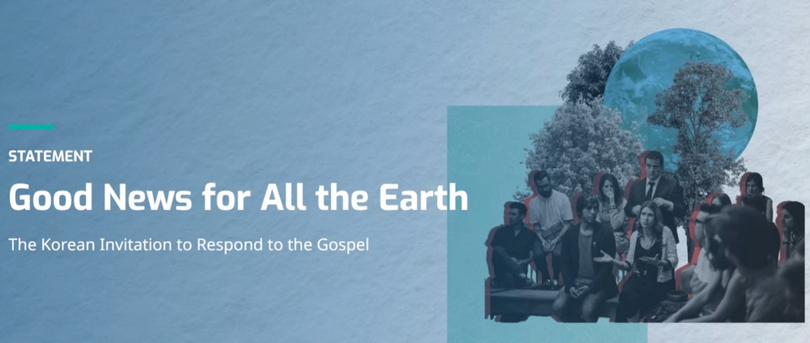The Lausanne/World Evangelical Creation Care Network (LWCCN) officially launched the Korean Invitation “Good News for All the Earth” in a webinar held last Thursday. The statement calls the global church to a new, biblical commitment to collaborative and practical action in caring for God’s world.
The Korean Invitation was drafted during the Global Creation Care Forum (GCCF), which took place in Gonjiam, South Korea, from September 28 to October 2, 2024, immediately following the Fourth Lausanne Congress on World Evangelization.
The webinar “What happened in Korea” was hosted by Dave Bookless, one of the three catalysts for creation care in the Lausanne Movement. He shared the background of the GCCF, the process of drafting the Korean Invitation, and the structure of the statement.
The story of LWCCN began in 2010 at the third Lausanne Congress, where the Cape Town Commitment declared that creation care is a gospel issue under the Lordship of Christ. Following the congress, Ed Brown approached Lausanne and became the first catalyst for the creation of a care network. He proposed a global consultation on creation care and the gospel, which was held in Jamaica in 2012. This consultation produced the Jamaica Call to Action, a significant document calling to urgent action for the worldwide church for creation care.
The momentum generated by the Jamaica Call to Action led to a series of 12 regional conferences between 2014 and 2022. Each conference responded to its local context and style but adhered to a shared framework. Participants examined God’s word to understand the biblical basis for creation care, considered the scientific realities of today’s environmental challenges, and explored practical ways to respond through churches, organizations, workplaces, and personal lifestyles.
These conferences helped build a robust global network, with approximately 1,600 to 1,700 individuals across more than 100 countries on LWCCN’s mailing list. The network also established a monthly publication called The Pollinator.
During the fourth Lausanne Congress in September 2024, creation care was a vital part. The State of the Great Commission document prepared for the Congress included a section on creation care, underscoring that the Lordship of Christ is at the heart of why Christians should care for creation. Despite this, discussions at the congress revealed that many in the evangelical world still do not fully understand why creation care matters. GCCF was convened to address these questions.
At the forum, participants explored key issues such as whether LWCCN should focus on regions or individual countries, whether there were global cross-cutting themes requiring collective action, and whether future gatherings could be held virtually to reduce the carbon footprint associated with in-person conferences.
The Korean Invitation was drafted by a five-people editorial team. Discussions during several sessions of the GCCF laid the foundation for the statement, which was refined over the following two months using Google Docs. Nearly 150 delegates, both in-person and online, contributed to the final version of the document during and after the forum.
In the webinar, Bookless introduced the statement’s structure, which begins with a biblical foundation, a missing part in the Jamaica Call to Action, and is necessary for many evangelical leaders.
The document explores creation, sin, the Fall, and its impact on all of creation. It highlights God’s covenant not only with humanity but also with the entirety of creation. The statement reflects on Jesus’ coming, emphasizing His work to restore broken relationships between humanity and God and to reconcile all things in heaven and on earth. It also points to the second coming of Jesus, when creation will be set free from its bondage to decay. On this biblical basis, the statement issues a call to urgent action.
The Korean Invitation outlines a series of steps for action, starting with cultivating a renewed relationship with God’s created world. It moves to practical applications at a personal level, such as lifestyle changes, and extends to implications for churches, Christian organizations, and educational institutions. It also emphasizes the need for action in workplaces, communities, and broader society, and addresses global ecological concerns.
The final section serves as an invitation to the global church—in villages, towns, and cities, among rich and poor, in every nation—to proclaim God’s good news for all the earth, rediscover a right relationship with creation, and commit to prayerful action.
The statement is published on both the Lausanne website and the World Evangelical Alliance Sustainability Center website, available for download and sign. Bookless encouraged participants to sign the Korean Invitation as individuals or on behalf of organizations with their agreement as an expression of commitment.
Laura Meitzner Yoder, a member of the drafting team, shared plans for an in-person launch event at Wheaton College this Monday in the United States. During the event, twenty participants would read aloud the statement’s twenty paragraphs, standing in a circle with guests at the center. The reading would be followed by a prayer of blessing for the statement as it is sent out into the world.
Yoder also encouraged others to celebrate the launch of the Korean Invitation in their local communities and with their peers.












